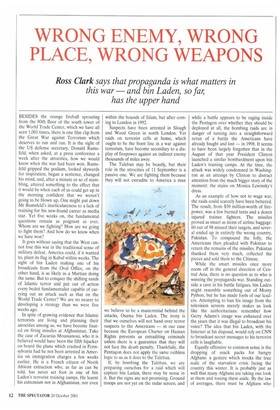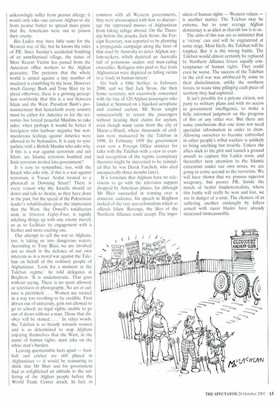WRONG ENEMY, WRONG PLACE, WRONG WEAPONS
Ross Clark says that propaganda is what matters in
this war — and bin Laden, so far, has the upper hand
BESIDES the orange fireball sprouting from the 80th floor of the south tower of the World Trade Center, which we have all seen 1,001 times, there is one film clip from the Great War against Terrorism which deserves to run and run. It is the sight of the US defense secretary, Donald Rumsfeld, when asked, at a press conference a week after the atrocities, how we would know when the war had been won. Rumsfeld gripped the podium, looked skywards for inspiration, began a sentence, changed his mind, and, after a minute or so of stumbling, uttered something to the effect that it would be when each of us could get up in the morning confident that we weren't going to be blown up. One might put down Mr Rumsfeld's inarticulateness to a lack of training for his new-found career as media star. Yet five weeks on, the fundamental questions remain as poignant as ever. Whom are we fighting? How are we going to fight them? And how do we know when we have won?
It goes without saying that the West cannot lose this war in the traditional sense of military defeat. America could, if it wanted to, plant its flag in Kabul within weeks. The sight of bin Laden making one of his broadcasts from the Oval Office, on the other hand, is as likely as a Martian doing the same. But to conquer the shifting sands of Islamic terror and put out of action every bedsit fundamentalist capable of carrying out an attack such as that on the World Trade Center? We are no nearer to developing a strategy than we were five weeks ago.
In spite of growing evidence that Islamic terrorists are living and planning their atrocities among us, we have become fixated on firing missiles at Afghanistan. Take the case of Zacarias Moussanoui, who it is believed would have been the fifth hijacker on board the plane which crashed in Pennsylvania had he not been arrested in America on immigration charges a few weeks earlier. He is a French citizen of North African extraction who, as far as can be told, has never set foot in one of bin Laden's terrorist training camps. He learnt his extremism not in Afghanistan, nor even within the bounds of Islam, but after coming to London in 1992.
Suspects have been arrested in Slough and Wood Green in north London. Yet raids on terrorist cells at home, which ought to be the front line in a war against terrorism, have become secondary to a display of firepower against an indirect enemy thousands of miles away.
The Taleban may be beastly, but their role in the atrocities of 11 September is a passive one. We are fighting them because they will not extradite to America a man
we believe to be a mastermind behind the attacks, Osama bin Laden. The irony is that we ourselves will not hand over terror suspects to the Americans — in our case because the European Charter on Human Rights prevents us extraditing criminals unless there is a guarantee that they will not face the death penalty. Thankfully, the Pentagon does not apply the same ruthless logic to us as it does to the Taleban.
If, by bombing the Taleban, we are preparing ourselves for a raid which will capture bin Laden, there may be sense in it. But the signs are not promising. Ground troops are not yet on the radar screen, and while a battle appears to be raging inside the Pentagon over whether they should be deployed at all, the bombing raids are in danger of turning into a straightforward rerun of a battle the Americans have already fought and lost — in 1998. It seems to have been largely forgotten that in the August of that year President Clinton launched a similar bombardment upon bin Laden's training camps. At the time, the attack was widely condemned in Washington as an attempt by Clinton to distract attention from the much bigger story of the moment: the stains on Monica Lewinsky's dress.
As an example of how not to wage war, the raids could scarcely have been bettered. The result, from $50 million-worth of firepower, was a few burned tents and a dozen injured trainee fighters. The missiles proved as smart as items of airline baggage: 60 out of 98 missed their targets, and several ended up in entirely the wrong country, Pakistan. To compound the folly, the Americans then pleaded with Pakistan to return the remains of the missiles. Pakistan thanked them very much, collected the pieces and sold them to the Chinese.
While the smart missiles once more zoom off in the general direction of Central Asia, there is no question as to who is winning the propaganda war. Standing outside a cave in his battle fatigues, bin Laden might resemble something out of Monty Python, but he has made fools of our leaders. Attempting to ban his image from the television screens merely makes us look like the authoritarians: remember how Gerry Adams's image was enhanced over the years that it was illegal to broadcast his voice? The idea that bin Laden, with the Internet at his disposal, would rely on CNN to broadcast secret messages to his terrorist cells is laughable.
Equally offensive to common sense is the dropping of snack packs for hungry Afghans: a gesture which mocks the true scale of the starvation crisis facing the country this winter. It is probably just as well that many Afghans are taking one look at them and tossing them aside. By the law of averages, there must be Afghans who unknowingly suffer from peanut allergy; it would only take one curious Afghan to die from peanut butter to spread mass panic that the Americans were out to poison their enemy.
Bin Laden may have little taste for the Western way of life, but he knows the rules of PR. Since Sunday's accidental bombing of an unmilitarised village, the status of Most Recent Victim has passed from the American office workers to the Afghan peasantry. The pretence that the whole world is united against a tiny number of madmen is crumbling by the hour. However much George Bush and Tony Blair try to plead otherwise, there is a growing perception worldwide that this is a war between Islam and the West. President Bush's pronouncement that henceforth every country must be either for America or for the terrorists has forced peaceful Muslims to take sides, when perhaps it would be better if foreigners who harbour negative but nonmurderous feelings against America were allowed to be bystanders. It is easy to sympathise with a British Muslim who asks why, if this is a war against terrorism and not Islam, are Islamic terrorists bombed and Irish terrorists invited into government?
It is easy to sympathise, too, with the Israeli who asks why, if this is a war against terrorism, is Yasser Arafat treated to a photocall at Downing Street? There is every reason why the Israelis should sit down and talk to Arafat, as they have done in the past, but the speed of the Palestinian leader's rehabilitation gives the impression that the West, like Orwell's totalitarian state in Nineteen Eighty-Four, is rapidly stitching things up with one enemy merely so as to facilitate its engagement with a fresher and more exciting one.
Our attempt to sell the war to Afghans, too, is taking us into dangerous waters. According to Tony Blair, we are involved not so much in the defence of our own interests as in a moral war against the Taleban on behalf of the ordinary people of Afghanistan. 'Look for a moment at the Taleban regime,' he told delegates at Brighton. It is undemocratic. That goes without saying. There is no sport allowed, or television or photography. No art or culture is permitted. . . . Women are treated in a way too revolting to be credible. First driven out of university, girls not allowed to go to school; no legal rights; unable to go out of doors without a man. Those that disobey will be stoned. .. . In other words, the Taleban is so beastly towards women and is so determined to stop Afghans enjoying themselves that the West, in the name of human rights, must take on the white man's burden.
Leaving questionable facts apart — football and cricket are still played in Afghanistan — it would be reassuring to think that Mr Blair and his government had as enlightened an attitude to the suffering of the Afghan people before the World Trade Center attack. In fact, in common with all Western governments, they were preoccupied with how to discourage the oppressed masses of Afghanistan from taking refuge abroad. On the Thursday before the attacks, Jack Straw, the Foreign Secretary, was reported to be planning a propaganda campaign along the lines of that used by Australia to deter Afghan asylum-seekers. which depicted an Australia full of poisonous snakes and man-eating crocodiles. Refugees who paid to flee from Afghanistan were depicted as falling victim to a 'trade in human misery'.
Go hack a little further, to February 2000, and we find Jack Straw, the then home secretary, not excessively concerned with the fate of 120 Afghan passengers who landed at Stansted on a hijacked aeroplane and claimed asylum. Mr Straw sought unsuccessfully to return the passengers without hearing their claims for asylum, even though many came from the city of Mazar-e-Sharif, where thousands of civilians were massacred by the Taleban in 1998. In February 1999 the government even sent a Foreign Office minister for talks with the Taleban with a view to eventual recognition of the regime (conspiracy theorists might be interested to be reminded that he was Derek Fatchett, who died unexpectedly three months later).
It is fortunate that Afghans have no televisions to go with the television suppers dropped by American planes, for although Mr Blair succeeded in winning over a domestic audience, his speech in Brighton reeked of the very neo-colonialism which so offends Islam. Revenge, the likes of the Northern Alliance could accept. The impo
sition of human rights — Western values — is another matter. The Taleban may be extreme, but to your average Afghan democracy is as alien as shariah law is to us.
The aims of this war are so indistinct that a 'victory' can and will be engineered at some stage. Most likely, the Taleban will be toppled. But it is the wrong battle. The Taleban would almost certainly be replaced by Northern Alliance forces equally contemptuous of human rights. They could even be worse. The success of the Taleban in the civil war was attributed by some to their disinclination, unlike the northern forces, to waste time pillaging each piece of territory they had captured.
It isn't possible for a private citizen, not party to military plans and with no access to government intelligence, to make a fully informed judgment on the progress of this or any other war. But there are some conclusions that one does not need specialist information in order to draw. Allowing ourselves to become embroiled in other people's tribal warfare is unlikely to bring anything but trouble. Unless the allies stick to the plot and launch a ground assault to capture bin Laden soon, and thereafter turn attention to the Islamic extremists under our own noses, we are going to come second to the terrorists. We will have shown that we possess superior weaponry, but poorer PR. Inside the minds of bedsit fundamentalists, where this battle will really be won and lost, we are in danger of a rout. The chances of us suffering another onslaught by killers armed with razor blades have already increased immeasurably.



























































































 Previous page
Previous page